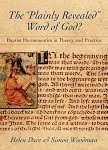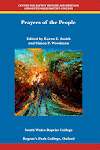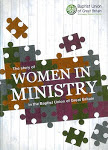A sermon for Bloomsbury Central Baptist Church
Sunday 27th
November 2022. Advent 1.
Habakkuk 1.1-4; 2.2-4,
20; 3.1-6, 17-19
For our engagement with Habakkuk this morning,
I want to acknowledge my debt to Juliana Claassens’ writing on this book.
She is Professor in Old Testament at Stellenbosch University in South Africa,
with a focus on human dignity and female resistance.[1]
Preachers don’t often show their working, so to speak,
although my online sermon scripts often have footnotes
to show what I’ve been reading.
But I think it’s helpful sometimes for those listening
to know that the person preaching is also a student,
learning from the wisdom of others.
And I don’t know about you,
but I’ve not spent much time
with the writings of the prophet Habakkuk over the years?
So it was something of a surprise to me
to discover that at one point in the mid-20th Century
it was deemed to be a ‘dangerous book’.
Apparently, in 1940, in the early years of the second world war,
a church newspaper in Basel in Switzerland published a column under the title:
“Word on the (Current) Situation”
that included an excerpt from the book Habakkuk.
The military censors then banned the newspaper
because they viewed this text as a critique of the Nazi regime of the time.
And I want us to hold on to this story,
because I’ll come back to it later.
Habakkuk is a dangerous text,
it is a book that inspires defiance.
It’s origins are found in an exceedingly traumatic time in Israel’s history,
in about the year 605 BCE
Not long before, the mighty Assyrian army had destroyed one city after the other,
brutally killing vast swathes of the population of Northern Israel.
And now the threat to the Southern Kingdom of Judah,
where Habakkuk lived under the reign of King Jehoiakim,
was coming from the Babylonian empire.
Habakkuk 1.6, which is outside of our selected verses for this morning,
helps us contextualise the book,
because it references the battle of Carchemish,
where the Egyptian Pharaoh’s army was defeated by the Babylonians,
and marked the point at which King Jehoiakim of Judah
started paying tribute to Babylon
in the hope of avoiding a confrontation or invasion.
And we know that not long after Habakkuk was written,
the Babylonians under king Nebuchadnezzar
would three times attack Jerusalem,
taking the leaders and skilled citizens into exile,
and in 587 BCE, just twenty years after Habakkuk
the Babylonians would destroy both the city and the temple.
Indeed, as Habakkuk puts it, violence is all around,
and the question that is uppermost in his mind, is why?
Why does he witness violence and injustice,
and what is God going to do about it?
This text might be over 2,500 years old,
but it still rings very real in our contemporary world,
where we too see violence, oppression, and injustice;
and on a scale that Habakkuk would have found incomprehensible.
It is this wrestling
with the gap between the world as we believe it should be
and the reality of the world as it is experienced by us,
that lies at the heart of Habakkuk’s message.
Why are things not the way they should be?
And what, in God’s name, is happening about this fact?
Well, the lectionary text for today
gives us three short sections from this fascinating book,
but if you have the time,
I’d recommend reading the whole thing through later,
it’s not very long.
In chapter 1 verses 1-4 we see how the prophet looked around
and was overwhelmed by all the violence he saw.
In verse 3, he asks why God is tolerating all these evil deeds,
and why he has to see all the injustice, the oppression,
the strife, and the terror around him.
And then in verse 4, the prophet laments
that the wicked are overpowering the righteous,
and that justice is being perverted.
Actually, the force here is more visceral than this,
and it comes with a trigger warning.
What Habakkuk is saying,
is that justice is being raped and violated before his eyes.
And in a world where sexual violence
is still used as a weapon of war,
and where domestic violence and sexual assault are rife,
I think we need to hear again the shocking truth
that injustice and sexual violence often go together.
The Babylonians used rape as part of their domination strategy,
as se find reflected in the book of Lamentations 5.11,
and Robin Parry comments on this passage,
‘In the ancient world rape was often used as a deliberate strategy of humiliation
to signal to opponents that they could not protect their own women.
Even after the siege and fall of Jerusalem the situation remain[ed] one
of ongoing violence in which the women of Judah are raped…
There is nowhere safe.
Judah’s enemies want to make clear who is in control’ [2]
Within in this context of violence, we hear Habakkuk’s lament:
“O Lord, how long shall I cry for help, and you will not listen?”
In the midst of this nightmare,
the only thing the prophet can do
is to help his people voice their pain,
to cry over the anguish they are experiencing.
Echoing the Psalms of lament as well as the book of Lamentations,
we hear how the prophet cries out to God:
“Lord, how long?
Lord, help me … ”
Habakkuk’s lament joins contemporary laments from all around the world
in which people have found the words
to name the situations of violence and injustice in their lives,
so resisting whatever is threatening their well-being and happiness. [3]
And here’s the cruicial thing:
to lament is not to give up, lie down, and die,
it is rather to resist,
and it does so by naming the evil,
by not allowing the injustice to escape unacknowledged.
It is significant to note that the violence and terror
would continue for a long time,
as evident in the ongoing description of violence
that marks the rest of the book Habakkuk.
Habakkuk’s lament offers no quick fix,
but typical to the prophetic voice in the Hebrew Bible,
violence and injustice are not allowed to have the last word.
And then, as we keep reading through,
God’s answer comes.
But God’s answer
was not what Habakkuk would have wanted to hear.
God says, “Wait. Be patient.
Deliverance is coming, but you will have to wait.”
This divine response challenges all the easy answers
or quick fixes that humans crave.
In Israel’s history, the prophet’s message
would be followed by many more years of violence and injustice.
Things would get much worse before they were to become better.
However, even amidst the most dire of circumstances,
we see how the prophet clings to God’s faithfulness and love.
We see this for instance in how the prophet continues to pray.
In Habakkuk 3:1, we read the prayer of the prophet
that is to be sung on the melody of a lament:
O Lord, I have heard of your renown,
and I stand in awe, O Lord, of your work.
In our own time revive it;
in our own time make it known;
in wrath may you remember mercy. (3.2)
Habakkuk reminds believers millennia later
how important it is to keep on believing
in a God that promises deliverance.
This unflinching belief in God’s ability to make an end to violence#
is precisely the reason why the book Habakkuk was banned in Nazi Germany
— the idea that God will end unjust power
was considered too dangerous to be tolerated.
The book Habakkuk also played a role in South Africa’s history
serving as an important source of resistance
against the apartheid regime of the time.
So Allan Boesak in the tumultuous 1980s
preached a sermon in London on Habakkuk 2,
imploring God:
“Lord, how long must we wait before you help?”
In his book The Tenderness of Conscience, Boesak says:
Black Consciousness, Black Power and Black Theology
merged and emerged as the key which unlocked the door
to the future for the oppressed people of South Africa
at a time when most of us thought that all was lost.
It rekindled the almost decayed hope in the hearts of the downtrodden,
reasserted the faith of the people in the liberation God of the Exodus,
the prophets, and of Jesus of Nazareth.
It reclaimed the gospel for the poor and the oppressed;
rediscovered and rewrote the vision
and ran with it as the prophet Habakkuk enjoins us to do,
unleashing the tremendous energies of a people
who, long before Thabo Mbeki discovered it,
knew that they were born of a people
who would not tolerate oppression.
It came at a most opportune time, a Kairos moment, to put it biblically,
and it paved the way for the decisive phase of the struggle
during the eighties
as it found expression in the United Democratic Front.
It became a spiritual force without which resistance to apartheid
would have remained singularly ineffectual. [4]
Boesak also quotes John Calvin,
who says the following on Habakkuk 2:6:
Tyrants and their cruelty cannot endure
without great weariness and sorrow …
Hence almost the world sounds forth these words,
How long, How long?
When anyone disturbs the whole world by his ambition and avarice,
or everywhere commits plunders, or oppresses miserable nations,
when he distresses the innocent,
all cry out, How long?
And this cry, proceeding as it does
from the feeling of nature and the dictate of justice,
is at length heard by the Lord …
This confusion of order and justice is not to be endured. [5]
The truth that Habakkuk knows
is that God hears the cries of those who are suffering
under the yoke of unjust regimes
and will one day bring an end to violence.
This is good news for those who are being oppressed.
But it not so good news for those who are abusing their power.
However, as the examples from Apartheid South Africa or the Nazi regime show us,
situations of violence can last many years and even decades.
Also in our personal lives,
we may find ourselves in a situation of pain and suffering without end.
Even the beautiful confession of faith with which Habakkuk ends
acknowledges that the situation of violence and suffering is far from over.
The fig tree does not blossom.
There are no fruit on the vines.
There are no livestock in the stalls.
And yet the wonderful thing about Habakkuk’s confession
is that the believer can still say,
‘I believe in a God that gives me strength to endure’.
Amidst the violence, amidst all the depravity,
The vision articulated by Habakkuk
is a vision of another world, of another way.
And as Allan Boesak again puts it,
the encouragement to overcome lies in
knowing with God and Habakkuk, that the vision lives.
Even though evil seems to prosper
and the law is paralysed so that justice never prevails,
the vision lives.
Even though the righteous are trapped, “hemmed in”,
have nowhere to turn to and justice is “perverted”,
the vision lives. [6]
And this is why we have the book of Habakkuk today,
as our reading for the first Sunday in Advent.
Advent is a time of waiting,
not just waiting for Christmas,
but of waiting spiritually,
a time of recognising before God
that the world is not the way that it should be,
and of longing with hope
for a new and better world of justice and peace.
The life of faith is, at its heart, a life of waiting,
of having faith that God’s coming Kingdom has not just vanished,
and that despite the evidence sometimes to the contrary,
evil and death do not get to write the last word on our lives.
And so we wait for God to act,
for God to break into our world, our lives,
with news of peace and justice.
As we approach Christmas,
we draw near to the celebration
of God’s intervention in the person of Jesus,
but we are conscious that still the world is not as it should be.
From Palestine to Ukraine,
from South Sudan to Ethiopia,
from Yemen to Myanmar,
to world is deeply divided and torn by conflict.
And we live in the time-between-times,
between the first advent and the long-awaited second.
And in this time-between-times,
we are called to live by faith,
longing for justice with a desire that drives us to our knees in prayer,
and then from our knees to a life of prayer in action,
as we live into being the promise of the in-breaking kingdom of God,
living as if it were true, until it is true.
One of the moments that will stay with me
from our recent visit to Palestine,
was our joining the worship service
of the Christmas Lutheran church in Bethlehem.
I was invited to assist the minister in the administration of the Eucharist,
and as he gave the bread, I held the cup for people to dip their bread into.
There we were in David’s town,
in the church named after the coming of the prince of peace,
and I was ministering to people who live daily with violence and oppression,
but who nonetheless turn up for church on Sundays
with the smile of hope on their faces
to receive the symbol and sign of the broken body of their saviour,
who was born in their town as a sign of hope.
One of those who came for communion was Daher Nassar,
from the farm known as the Tent of Nations,
which has been in his family for hundreds of years.
We had visited the farm a couple of days earlier,
and this smiling man had shown us how he works his land,
but had also told us how the bulldozers come in the night
to destroy his olive trees,
and of how young men had come one afternoon earlier this year
and beaten him and his brother with iron bars. [7]
He had told us how his family farm had been declared state land,
and of his decades-long legal fight to not be evicted.
But still the stone at the entrance to their property
bears its carefully written inscription,
declaring the heart of their Christian faith:
‘We refuse to be enemies’.
As the Lord said to Habakkuk:
‘Write the vision; make it plain on tablets,
so that [even] a runner may read it’
It was an immense privilege to be part of his receiving communion,
and to see his face smile with recognition when he saw me.
Friends, the world is not as it should be,
and evil and violence and oppression
still stalk the land where Christ was born,
and the world he came to save.
Sometimes all you can do is lament.
But we who have lamented with Habakkuk,
and who have seen with him a glimpse, a vision, of a better future,
will not give up:
we will live in faith!
And faith like this is an act of defiance,
faith like this challenges the powerful, and lays low the mighty,
faith like this refuses to ignore the plight of the suffering,
and faith like this, lived in hope,
opens the doorway to the new world of Christ’s coming kingdom.
[1] https://www.workingpreacher.org/commentaries/narrative-lectionary/faith-as-a-way-of-life-2/commentary-on-habakkuk-11-4-22-4-33b-6-17-19
http://www.scielo.org.za/scielo.php?script=sci_arttext&pid=S2413-94672015000200009
http://www.scielo.org.za/pdf/ote/v34n3/09.pdf
[2] Parry, Lamentations, Two Horizons Commentary, p.151.
[3] Nancy C. Lee, ‘Online Material for Lyrics of Lament: From Tragedy to Transformation’ http://ms.fortresspress.com/downloads/9780800663018WebLinksLyricsofLamentnew.pdf?redirected=true
[4] Allan Boesak, The Tenderness of Conscience, p.10.
[5] John Calvin, Calvin’s Commentaries on the Twelve Minor Prophets, Habakkuk 2: 6, volume 4, 93-94:
[6] Allan Boesak, The Tenderness of Conscience, p.234.
[7] https://www.presbyterianmission.org/story/tent-of-nations-brothers-speak-out-about-jan-28-attack/













